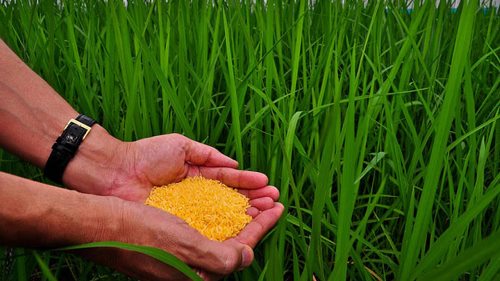 |
| Genetically modified rice. PHOTO: irri.org |
Written by the Editorial Board of The Guardian Newspaper
The move by the Federal Government to enforce regulations on genetically modified rice (GMO rice) in the country is a step in the right direction to curb abuse and safeguard the populace. There are controversies surrounding GMO or biotech crops and products, which make them unacceptable in many countries. Caution must therefore be exercised as Nigeria ventures into GMO crops to prevent endangering the health of the citizens.
Nigeria is not well versed in research like America and some developed countries to be able to unravel the full implications of GMO crops and products on public health and the environment. Consequently, appropriate authorities should closely monitor what is being done on GMO rice and others. Accredited research institutes should not foreclose the negative consequences associated with GMO crops.
Director-General of the National Biosafety Management Agency (NBMA), Dr. Rufus Ebegba, recently visited the National Cereal Research Institute, Badeggi in Niger State that conducts field trials on GMO rice. The visit, according to Ebegba, was to ensure strict compliance with extant laws or rules. Ebegba warned that the agency would seal off any research centre that fails to adhere to laid down protocols, saying that nobody would be forced to consume any genetically modified product.
Furthermore, he threatened to shut the research institute if it fails the next round of preliminary trials, stressing that the agency is there for total compliance because of its importance to farmers and others. He hinted that research into GMO rice would take between four to five years to conclude, noting that the varieties that may eventually be approved would be able to withstand drought.
Ebegba explained that with biotechnology, local genes of a crop can be identified and put into commercial use. He, however, regretted that technical errors were responsible for the failure of the last field trials of GMO rice, stressing that if the structures are not well placed, they could lead to contamination of seeds.
GMO rice is a strain that has been modified genetically to increase micronutrients like vitamin A, accelerate photosynthesis, resist pests, tolerate herbicides, increase grain size, generate nutrients or flavours and produce human proteins.
The new strain is implanted with new traits that, normally, are not found in ordinary rice. Thus, the rice potential is boosted, which raises the question of safety to the human body and the environment.
Because new materials or elements are introduced, thereby making GMO rice to be resistant to common pests and diseases. is such a genetically modified rice, therefore, safe, since the modification already alters its composition? Like irradiated food, that doesn’t expire, the question is whether such product is still safe for human consumption. How long then would the rice last? Or would it last forever? Are GMO products biodegradable? These are critical questions that should be answered.
What is often called horizontal gene transfer could also occur through mediated natural vectors. For instance, gene transfer between rice and millet has been identified. Nevertheless, the cultivation and use of GMO varieties of rice remains controversial and not allowed in some countries.
Anything that impedes the natural process of degradation ought to be treated with caution before human composition. Such product might also not be environment-friendly. For instance, what effect would GMO crops have on earthworms and other soil microbes? Are there no deleterious effects on ground water?
The desire to embrace biotechnology in food production should be weighed against its collateral damage. To that extent, caution should be the watch- word. There is need to know the full implications of GMO rice before introducing it in Nigeria. Besides, Nigeria is not short of arable lands where normal rice and other crops can be produced. Nigeria should explore what it has first before dabbling into the unknown.
Since research is the plank upon which GMO crop strains are developed, to what extent is Nigeria prepared to do the necessary research? Research institutes are comatose. The universities are barely functional. Transferring gene from one crop to another requires painstaking effort by scientists who are committed and well motivated.
Does Nigeria have this crop of scientists to work on GMO crops? How much funding is available for the research given, especially against the background of gross underfunding of universities and research institutes?
Truth is that GMO is not popular around the world. The few developed countries that have embraced it have strict rules and regulations governing it including labeling of GMO products in supermarkets to differentiate them from others..
Unfortunately, Nigeria has not advanced to that level. Nigerians buy and sell in open markets with no rules and no inspection by public health personnel. There are too many dubious characters out there to make money by selling injurious products. Not enough education to prevent avoidable problems is available. Not enough cautionary measures taken yet on GMO or other potentially dangerous products.
(adsbygoogle = window.adsbygoogle || []).push({});

